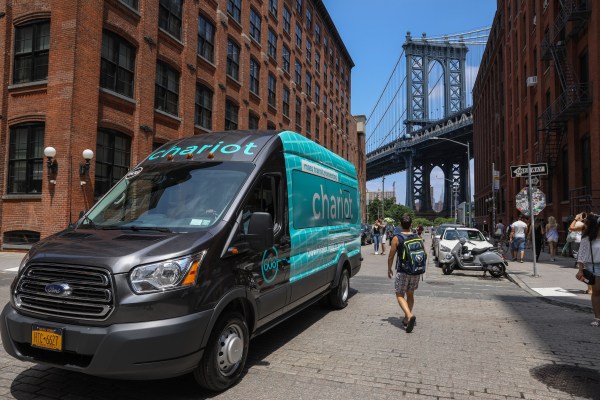As automakers continue to work on their strategies for the next generation of transportation, one of the biggies is making a change to its leadership structure. Ali Vahabzadeh, the CEO and co-founder of ride-sharing startup Chariot, which Ford acquired in September 2016, has left the company.
“We thank Ali for his passion and dedication to building Chariot into the growing mobility business it is today,” the company told TechCrunch in a statement. “We are glad he will continue to serve Chariot as a director on the Chariot board, and all wish him well in his next adventure.”
He has been replaced in the interim by Dan Grossman, who leads Microtransit for Ford Smart Mobility, while the company looks for a permanent person to lead Chariot.
It seems that Ali himself had quietly announced his departure two weeks ago, to no one’s notice — writing that he wanted to step away to pursue his next entrepreneurial venture.
But this may not be the full story. The person who originally provided the tip to TechCrunch alleges that Vahabzadeh was actually fired in early February after employees co-signed a letter to Ford’s CEO James Hackett complaining about toxic work culture and poor employee retention. Ford declined to comment on this. (We are also following up on this allegation. If you know something, you can send it anonymously to us via our tips page.)
Ford acquired Chariot in September 2016 as part of its efforts to build alternative transport services for people moving away from fully owning and driving their own vehicles.
It bases its service around a fleet of transit vans whose routes are aimed at commuters, and where what routes are offered is based on a “crowdsourced” vote.
The startup was launched at Y Combinator and had only raised around $3 million before Ford acquired it, reportedly for $65 million plus earn-outs.
Chariot started in San Francisco but has had its eye on growing. In January 2017 it announced plans to expand to another eight cities (it’s currently active in five in the US, including New York, Columbus, Austin-San Antonio and Seattle). As of this month it is now also in London with plans to expand elsewhere in Europe.
“We’re going to be super aggressive in expanding to multiple markets over the next year,” said Vahabzadeh in an interview with TechCrunch at the time of the acquisition. “It became very clear very early on that Chariot would be able to leverage Ford’s expertise in logistics and vehicle and operations to take Chariot and make this a global service, beyond just the Bay area.”
But growth has not been without hiccups. In October, Chariot had to halt service for a period in San Francisco after failing to pass a series of California Highway Patrol inspections.
In terms of competition, there are a number of other services looking to fill in the gap between private cars; taxis and other single-destination ride-hailing services; buses; trains; and your own legs. They include services like Uber Pool, startups like Via, and new services that appear to be emerging by the week, such as this new Smart Bus effort from Citymapper in London.
Update: Since publishing earlier today, we’ve received further reports from employees — some corroborating the facts we mention above about bad employee retention and morale (including text from the alleged memo) and Ali’s role; and some characterizing it differently, acknowledging some issues but saying that the founder’s departure was unrelated.
